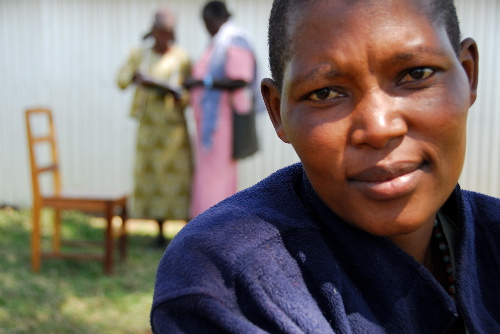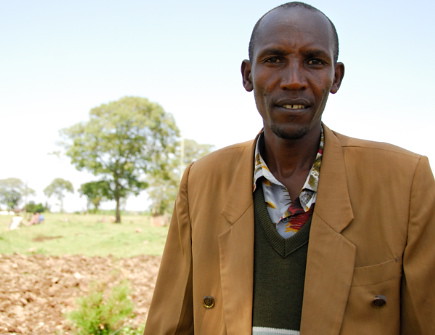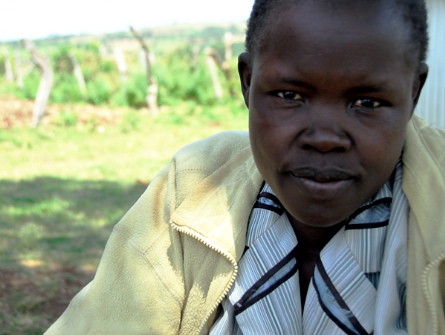As the parents entered the gate to Kakenya’s school, I noticed the majority of them were fathers. There were no couples, but plenty of men carrying their power sticks. I was interested to talk with them, mothers and fathers, before the assembly began. Here’s what a few parents had to say about the budding Center for Excellence and their daughters’ education:
 Photo: Kate Cummings. Location: Enoosaen, Kenya. Partner: Vital Voices
Photo: Kate Cummings. Location: Enoosaen, Kenya. Partner: Vital Voices
Rhodah Chemonget is 25 years old with 4 kids (2 of them girls). Rhodah has one daughter attending Kakenya’s Center.
Q: Have you noticed improvements in your daughter since she started at this school?
Rhodah: She’s doing well. When she was in another school, she wasn’t concentrating on her work. But now, when she gets home, she is always reading. My other kids don’t read at home.
Q: How far did you go with your education?
Rhodah: I went to Class 5 [fifth grade]. I wanted to go farther, but my parents refused. My life would have been better if I’d gotten more education. But now, my life is hard. If I’d gone to school, I’d be earning an income – not taking the donkeys to collect maize everyday.
Q: How do you want to raise your daughters differently than your parents raised you?
Rhodah: For a long time, fathers just wanted daughters to be married so they can get cows – but I, I want my daughters to go all the way with education.
 Photo: Kate Cummings. Location: Enoosaen, Kenya. Partner: Vital Voices
Photo: Kate Cummings. Location: Enoosaen, Kenya. Partner: Vital Voices
Paul Murunka is 39 years old with 8 kids (5 of them girls)
Q: What are your expectations for your daughter at this Center of Excellence?
Paul: I am expecting my child to prosper in education. This school will be different than others. Judging from the title, “excellence”, and its good foundation, I know it will be an excellent school.
Q: Has your daughter changed since she started school here?
Paul: My daughter is improving. She’s speaking in English, and also she’s not shy like she was before. I want to see her being among the first in the class.
Q: Why do you want for your daughter to receive an education?
Paul: Culturally, girls aren’t supposed to inherit anything from the family. I want, while I am alive, for my daughters to inherit an education from me.
Q: Is there anything else you want to say?
Paul: May God bless Kakenya, because she is not selfish. She is making more Kakenyas here [gestures to the children playing in front of the school].
 Photo: Kate Cummings. Location: Enoosaen, Kenya. Partner: Vital Voices
Photo: Kate Cummings. Location: Enoosaen, Kenya. Partner: Vital Voices
Christian Saleh is 33 years old with 3 kids (all of them girls – two attending Kakenya’s Center). Christian was the only other girl in eighth grade w/Kakenya when they were at the end of primary school; all the other girls were dropping out to be circumcised and then married.
Q: Do you have expectations for your daughter at this school?
Christian: The aim I have is for my girls to finish school here and continue other studies. I finished school up to Class 11 [eleventh grade] – I didn’t finish my schooling because I couldn’t pay the school fees. I wish I had finished.
Q: Was it difficult to be the only other girl w/Kakenya in Class 8? How do you want your daughter’s education to be different from your experience?
Christian: Sometimes the boys would beat us and we ran away from them. Sometimes I had to stay at home to take care of the younger kids, the farm – I had to miss school sometimes to do work for my family. I want my daughters to do well in exams and go farther than I did. I don’t want my daughters to have to stay home and take care of the animals.
Posted By Kate Cummings
Posted Aug 12th, 2009

